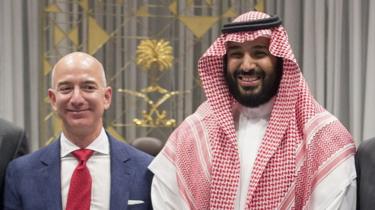 GETTY IMAGES
GETTY IMAGES
Saudi Arabia has denied that its crown prince was responsible for hacking Amazon boss Jeff Bezos' phone.
A message from a phone number used by the prince has been implicated in the data breach, according to reports.
The kingdom's US embassy said the stories were "absurd" and called for an investigation into them.
It was previously claimed the alleged hack was linked to the murder of Washington Post writer Jamal Khashoggi at the Saudi consulate in Istanbul.
As well as being the founder of online retail giant Amazon, Mr Bezos owns the Washington Post.
Mr Bezos' phone was hacked after receiving a WhatsApp message in May 2018 that was sent from Mohammed bin Salman's personal account, according to the Guardian newspaper.
The Financial Times reported that an investigation into the data breach found the billionaire's phone started secretly sharing huge amounts of data after he received an encrypted video file from the prince.
The Twitter account of the kingdom's US embassy issued an outright denial and called for the claims to be investigated.
Amazon did not immediately respond to a request for comment from the BBC.

 REUTERS
REUTERSHacking 'horribly easy to do'
Analysis by Jane Wakefield, BBC News technology reporter
While the details of how this happened aren't yet public, evidence is pointing towards a WhatsApp conversation between the two men during which an infected video file was allegedly sent.
It is unclear what the content of that video was, but there is huge interest in finding out what a crown prince might send to one of the world's most powerful tech leaders.
Such a hack is "horribly easy to do", says computer expert Professor Alan Woodward. The seemingly innocent video would have contained malware that surreptitiously installed itself on the targeted phone.
From there it would have been possible for the hacker to gain access to all the functions of the phone, from the GPS locator, to the camera, to the banking facilities and messaging apps.
Such access is made possible via bugs in the code and, last year, a security flaw in WhatsApp was revealed that would have allowed hackers to hide malicious code inside video files.
Phone hacking is, says Prof Woodward, all too common in certain countries that are keen to keep an eye on journalists, dissidents and other activists perceived to be a threat to their regimes. So-called stalkerware is available off the shelf to these governments.
But what about the involvement of the Saudi crown prince? Was it really him who installed the malware?
It is unlikely that he set the phone up himself. So was his phone also being spied on? Or was he simply a vessel being used by the Saudi authorities?
The plot thickens.

The reports come after private information about Mr Bezos was leaked to the American tabloid the National Enquirer.
In February 2019 Mr Bezos accused the National Enquirer of "extortion and blackmail" after it published text messages between him and his girlfriend, former Fox television presenter Lauren Sánchez.
A month earlier he and MacKenzie Bezos, his wife of 25 years, announced that they planned to divorce having been separated for a "long period".
- Was Jeff Bezos the weak link in cyber-security?
- Saudi Arabia accused over Bezos hack
- What happened to Jamal Khashoggi?
This is not the first time the kingdom has been linked to the hacking of Mr Bezos' phone.
In March last year an investigator for the Amazon founder said Saudi Arabia was behind the hack and it had accessed his data.
Gavin de Becker was hired by Mr Bezos to find out how his private messages had been leaked to the National Enquirer.
Mr de Becker linked the hack to the Washington Post's coverage of the murder of Saudi writer Jamal Khashoggi at the Saudi consulate in Istanbul.
Bbc news

.jpeg)
.jpeg)
0 Comments